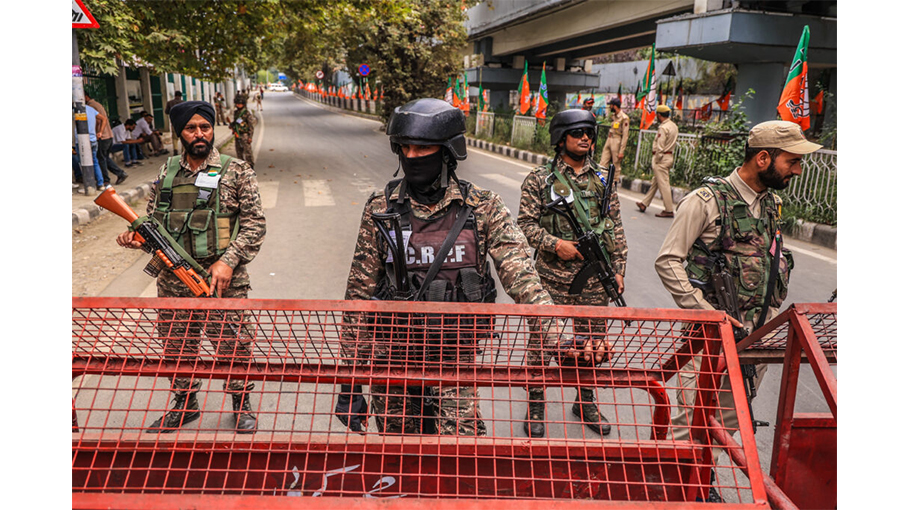Kashmir to remain a thorn in the side of India–Pakistan relations

The issue of sovereignty over Kashmir has remained a significant point of friction in the India–Pakistan relationship since 1947. The two states have fought several wars and have been involved in regular skirmishes in the region. The last major conflict fought between the two was the Kargil War in 1999, but there have been periodic clashes on the Line of Control since then.
For both governments, the Kashmir issue is the primary obstacle to the normalisation of ties. Pakistan has been vocal about what it claims are human rights violations committed by Indian security personnel in Jammu and Kashmir (J&K), while India has maintained that Pakistan funds and supports domestic insurgencies in the region. There has been an uptick in attacks in 2024, with the most recent militant–military engagements leading to the death of an Indian officer.
In April 2024, Pakistan’s Ministry of Foreign Affairs criticised the Indian government for the ‘alarming surge in provocative statements’ from Indian leaders, while In July a former J&K director general of police alleged on social media that the region had been infiltrated by Pakistani Special Service Commandos. These tit-for-tat allegations remain a sticking block for any meaningful breakthrough in the diplomatic deadlock.
The future of India–Pakistan dialogue ultimately hinges on both states reaching consensus on a practical and long-term solution that addresses the grievances people on both sides have experienced. But there have been few genuine attempts to find a non-violent resolution to the issue.
In 1964, a much-anticipated visit by Indian Kashmiri leader Sheikh Abdullah to Rawalpindi for talks with Pakistani president Ayub Khan was supposed to be followed by a visit by Khan to Delhi for further discussions. But due to Indian prime minister Jawaharlal Nehru’s untimely death, these talks did not materialise.
In 2001, Pakistani president Pervez Musharraf’s visited India for the Agra summit and proposed a four-point plan for resolving the dispute, which was also rejected after several days of discussion. Since then, there has been a noticeable lack of attempts to find a long-term solution to maintain stability and peace in the Kashmir region.
China’s relationship with both states is the second major hurdle for diplomatic engagement. India sees China as a regional rival in South Asia and the wider Indo-Pacific. The states are geopolitical rivals and disagree on a number of issues, including Tibet. The China–India rivalry has resulted in greater collaboration between India and the United States, which has a vested interest in countering Chinese influence. India and China are destined to remain strategic and economic rivals.
China has invested heavily in projects and initiatives in Pakistan as part of the China–Pakistan Economic Corridor. Pakistani Prime Minister Shahbaz Sharif has lauded China’s support, saying that closer ties with the United States would not come at the risk of losing China as an ally. Pakistan and China also had a minor border dispute resolved through an agreement in 1963, an event the Indian government does not recognise.
The China factor will become increasingly important in the coming years. India is on the rise, while Pakistan is becoming increasingly indebted to China. China is actively seeking to increase its influence and global reach, challenging the United States as a regional hegemon. These factors will complicate any future India–Pakistan dialogue.
Both the Indian and Pakistani governments are stuck in a political deadlock. Neither will back down on Kashmir, and while China is a rival of India, Pakistan is heavily reliant on China as an economic and strategic partner. India has fast overtaken Pakistan in economic development and is more politically stable.
It is Pakistan that has more to gain from revisiting economic and diplomatic ties with India. The country is at an economic low point and has experienced great political unrest. The launch of the recent anti-terrorism initiative Azm-e-Tsehkham highlights just how much of an issue domestic terrorism is for the state.
For both India and Pakistan, resolving the Kashmir issue is the first step to dialogue. But the chances of this are bleak. For Indian Prime Minister Narendra Modi and his Bharatiya Janata Party, the integration of J&K was a long-promised policy. When the abrogation of Article 370 of the Indian constitution was announced in 2019, revoking the region’s special status, Modi was greatly lauded domestically. After India’s Supreme Court upheld the abrogation of Article 370 in December 2023, there is seemingly no way back for Modi and his party. The Indian Government also announced that polls would be held in the province starting on 18 September 2024 — for the first time in nearly 10 years — further indicating their intent to provide some stability in J&K.
Muhammad Saad Ul Haque is Research Analyst at the Institute of South Asian Studies, National University of Singapore.





